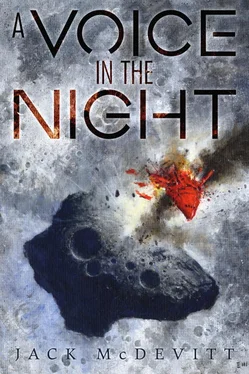Yes, she thought. It would be terrible to have lived and died. And to leave no sign of your passing. It seemed to her that someone among the Capellans, at some point, would have contemplated the ages and known that she would come.
Greetings, young lady from London.
She was getting quite high. And the ramp looked hopelessly narrow.
The wind played in her hair, blew it in her eyes. At the ramp on the third level, she tied it back.
Darkness poured out of windows and doorways. This time she did not cast her light into the building. The place felt like a church. Maybe her father was right; maybe it would not be a good setting for a Christmas party.
At the fourth floor, she stood beneath the balcony. It was gently curved, relatively narrow near the sides, broader toward the center. It was wide enough to play tennis on, if one didn’t mind a precipitous drop along the fault line. A network of struts supported the structure. Some were almost low enough to touch.
She walked to the corner, turned, and climbed the final ladder.
Her hands and shoulders were beginning to ache. She puzzled about it as she ascended, grateful for any kind of distraction from the void over which she clung. Her breathing had become somewhat uneven, and she gripped the rungs tightly. Maybe that was the reason she was hurting.
The fifth-level ramp did not have direct access to the balcony. It ended only a couple of meters away, but there was nothing to prevent her from jumping across. The only obstacle was the narrow rail around her own perch. It was a jump she could easily make. On the ground. But up here. No thanks.
An entrance to the building was located just a few meters away. She intended to use it and come out onto the balcony. Safe and sane. Then she would haul up her tree. But there was a problem: there was not enough cable remaining for her to carry through the building.
She considered lifting it to the ramp where she now stood. But the tree was around the corner and in the wrong position. It would get dragged about thirty meters.
No: she had to get her remaining cable, about ten meters of it, across the open space.
She could try throwing it. She took the loop from her shoulder and placed it on the ramp. It began to slide over the edge. Too much weight.
She could jump.
She could use her head. She needed a weight. There had to be something nearby that would serve. Maybe some loose rubble.
She inspected the ramp, all the rooms that opened out on this side of the building, and a couple of passageways. The only movable object was another door laid against a wall. She couldn’t very well heave that across the space.
What else?
Her pouch. She took out its contents, and removed her jacket and shoes and stuffed them in. When she’d finished she wound several lengths of cable around it, and set it down. Satisfied, she walked to the railing, looked across at the graceful sweep of the ancient balcony, and made one or two practice motions with her right hand. Then she launched the pouch.
It sailed across the abyss, trailing silver line, bounced, and skewed toward the edge while her heart fluttered. And rolled to a stop.
Pleased with herself, Sylvie hurried into the passageway. It was cold. The air was cold, and the ground over which she moved chilled her stockinged feet. When the corridor turned away, she entered a suite of rooms, and spotted the balcony through a window.
It spread before her, an esplanade, a courtyard without walls. The fine dust which had accumulated on it sparkled in the starlight. She could see no footprints, but there was enough wind during the day to erase any marks left by researchers.
Fluted columns were scattered randomly through the area. The design of the columns was strange: they were not whole, but only fractions, slices, like pieces of pie, which appeared to have had their tops lopped off. Some were cut flat across, others were sharply angled. Only one was taller than Sylvie, and that by not much more than a hand’s-breadth. They supported nothing.
She swung a foot over the sill.
The edge of the ramp on which she’d stood was on her right. The pouch, and the cable, lay where it had fallen. She climbed out through the window, and retrieved them.
Then she turned to face the Aerie.
A high triple doorway anchored the balcony, but, in the unsymmetrical style of the Capellans, it was well to the right of center. The doors and windows all gaped at her now, black and exposed. There had once been glass.
And light.
And music? Had these people known music? What would it have sounded like? How sad to think that, whatever it might have been, it was gone now, lost forever.
Yet the Aerie did not feel like a dead place. The way cemeteries felt, for example. Or the Antiqua , the alien starship orbiting Deneb, its origin unknown, its mummified crew still at their stations. No: maybe the Capellans were so long gone that no part of them remained, and so this was only a pile of rock and plastic. Or maybe this place had thoroughly served its purpose, and its builders had lived their lives and moved on and nothing more could be expected.
She smiled. It was spooky up here. Hard not to keep her eyes on the silent openings, not to suspect that, the moment she turned away, there would be movement inside.
The half-column she wanted was located ten paces from the edge. Its top was angled at about thirty degrees, and it was waist-high. She removed the cable from her shoulder, took in the slack, and secured it to the half-column. Then she began to reel in the tree. It was not as heavy as she had feared. She drew it in, hand over hand.
Occasional gusts came close to blowing her off her feet. And brought occasional snatches of song to her. She could see lights and occasional movement in the streets.
What had it been like when the Capellan city was spread across the plain, with rivers of light flowing through the nightscape, and the stars cold and bright? And the natives had stood on, or floated across, this balcony? This balcony with no protecting wall. Its floor in fact dipped slightly as it approached the edge, as if to provide a running start into the void.
Launch pad.
The tree broke a couple of branches coming in, and it lost a couple of ornaments. But otherwise it arrived in good condition. But when she released the restraining cords, the big yellow branches spread out, and the reindeer and blue globes looked reasonably intact. She straightened the star, and set it into its stand.
A burst of wind almost took it out of her hand. Okay: she picked a spot where it would be visible from town, but which allowed her to secure it among three columns. She tied it carefully in place, fluffed out the branches and adjusted the ornaments. When she was satisfied, she attached the battery, and picked up the remote.
Sylvie looked again at the dark face of the building.
If anyone is watching, merry Christmas.
She squeezed the unit, and the lights blazed on.
The tree was magnificent: its soft glow spilled across the balcony.
She climbed down out of the building and tested the remote. It shut the lights down. Beautiful. They should have the lights for several nights before the battery wore down. She switched them back on, clapped her hands and saw the alien city, incandescent in the moonless night, spread to the horizon. And she felt the wind suck at her, draw her forward. It whispered into her wings, and could have given her a lift toward the stars.
She felt herself gliding into the night, riding a gust of cool air, curving round the Queen.
Halfway to town, she met her father. He had Jerry Haskin with him, and Millie Michel, and Clem Sangmeister, and two or three others. They were hurrying toward the Aerie. But they stopped and her dad grabbed her and showed his relief. “You okay, Sylvie?”
Читать дальше










